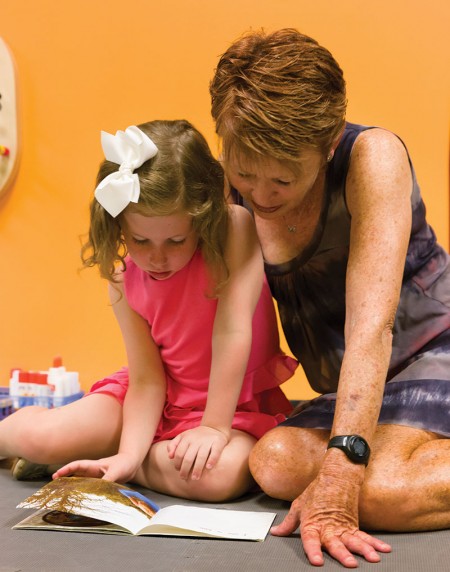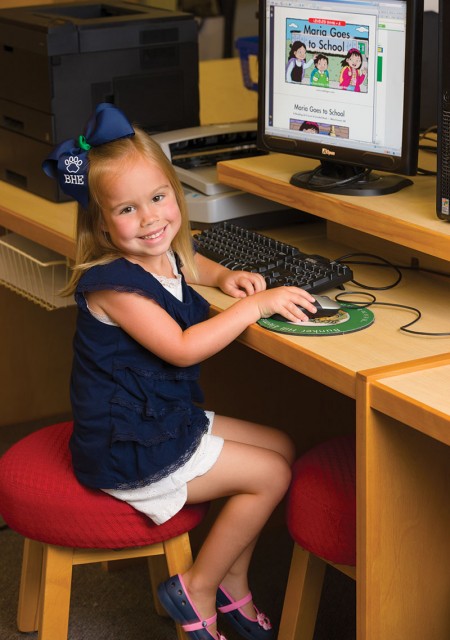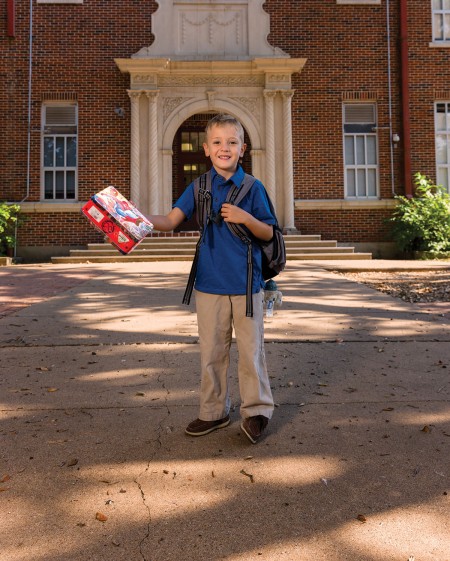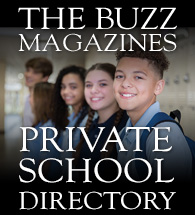Kindergarten These Days


Veteran Condit Elementary kindergarten teacher Kathy Higgins says sitting on the floor with children, like 5-year-old Lexie Rose, is still the best way to connect. (Photo: www.hartphoto.com)
Kindergarten is not what it used to be. Half days at school and nap time on mats are gone, replaced with iPads in the classroom and rigorous reading benchmarks. Our cultural shift toward doing things bigger, faster and better is as apparent at school as anywhere else. And not everyone thinks it’s a good idea.
“The skills they have to master have more than tripled in the last 10 years,” said Condit Elementary kindergarten teacher Kathy Higgins. Most of the children who enter her classroom this fall will have had several years of preschool and highly informed parents who know the curriculum. That, combined with new technologies, she says, is fueling the faster academic pace.
Former first-grade curriculum is now taught in kindergarten, and kindergarten skills are learned in prekindergarten. Thirteen years ago, when Higgins began at Condit, a student who knew a few of the high-frequency reading words and could read a small amount by the end of the year was deemed ready to move on to first grade. “Now, I couldn’t promote that same student,” she said.
The best teachers still find ways to keep traditional fun and nurturing in the classroom. Each Thanksgiving the Condit Elementary kindergarten classes have a feast and put on a short program. For many, the highlight of the event is wearing a turkey headband while singing and dancing an actual tango to The Turkey Tango.
Higgins maintains that learning has to be fun and hands-on. Her students participate in a readers theater where they act out parts from a book. Each child introduces himself or herself and reads from a script. “They think they’re just having fun, but they’re learning how to read with inflection and pause at appropriate times,” she said. “They are also building confidence.”

Libby Hays and her fellow kindergarteners use the computer reading program Reading A-Z at Bunker Hill Elementary. (Photo: www.hartphoto.com)
So, what happens to the children who are not ready for the new kindergarten? Many of them spend an extra year in preschool, known as a bridge year. Frostwood Elementary third-grade teacher and former kindergarten teacher Barbara Perry says some children simply are not ready for the amped-up academic requirements.
“You have to wait until the child is ready,” Perry says. “It doesn’t matter how you teach it. If they’re not developmentally ready then it’s not going to stick.” She believes kindergarten should be more focused on social readiness and less on academics. “They’re 5 years old. They need to learn how to play together and get along,” she said.
Learning through play is still the best way to connect with children, she said, and kindergarten teachers are skilled at recognizing when each individual child is ready to learn a specific task. “One day a light bulb goes on and they are ready,” Perry said.
The push towards learning earlier may be wasted energy. Even when children can absorb and process skills at a younger age, Perry says that by third grade the children have evened out. Reading at age 5 seems to have little bearing on how advanced the child will be in a few years.
Children with summer birthdays, who would traditionally be the youngest in the class, increasingly are waiting a year to begin kindergarten so they can be the oldest in class instead. But experts say parents should not take this as the default position, and should instead look for signs of emotional readiness.

With a new lunchbox in-hand, West University Elementary kindergartener Ethan Shor is looking forward to a great year. (Photo: www.hartphoto.com)
“It comes down to the individual child,” says educational diagnostician Emily Waltmon. She points to a few factors that may suggest the child is ready. Knowing letters and their sounds, being able to follow multi-step directions and being able to share with others are signs that even a younger child is ready for kindergarten.
West University Elementary mom Chelsey Shor recently made the decision about whether her newly 5-year-old son Ethan should start kindergarten or wait another year. “He did well on the Vanguard test, and I feel like he’s ready,” Shor said. Ethan will start kindergarten this month and will likely have classmates who are a full year older because they had an extra year of preschool.
Fortunately most kindergarteners are blissfully unaware of the increasing academic requirements. Incoming Bunker Hill Elementary kindergartener Libby Hays has the same simple expectations that children have had for decades.
“I’m excited to meet my teacher and make new friends,” she said. And if these friends share her love of dressing like a princess and make-believing, then she is in for a great start to elementary school. Perhaps, in some ways, today’s kindergarten is not all that different after all.
Want more buzz like this? Sign up for our Morning Buzz emails.
To leave a comment, please log in or create an account with The Buzz Magazines, Disqus, Facebook, or Twitter. Or you may post as a guest.


